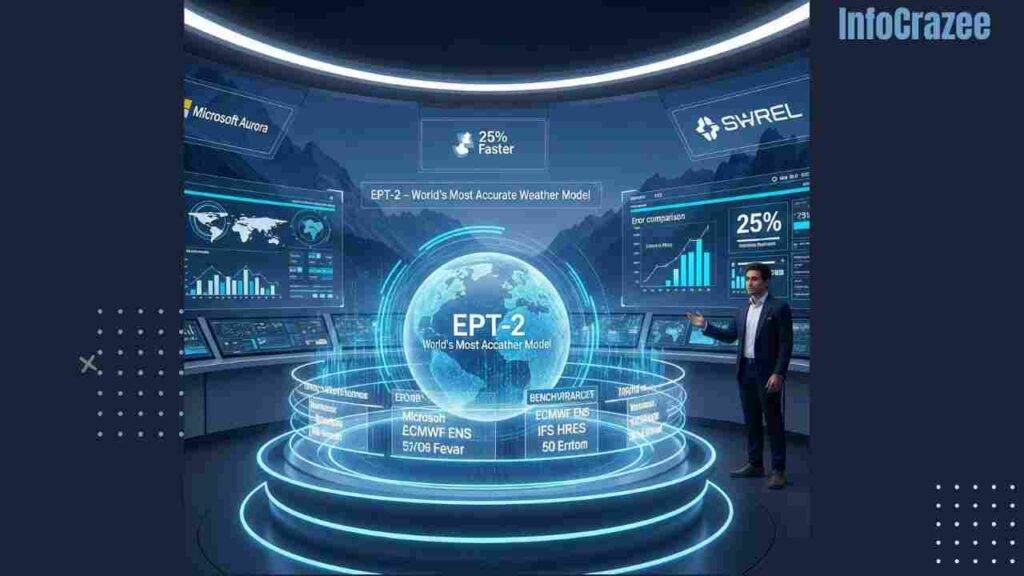Swiss Startup Jia’s AI Weather Model Shakes Up Industry, Claims Superiority Over Microsoft and Google
In a bold challenge to tech giants, Swiss startup Jua has unveiled its AI-powered weather forecasting model, EPT-2, which it claims outperforms industry leaders like Microsoft’s Aurora and Google DeepMind’s GenCast. Backed by a new peer-reviewed study, Jua’s model is positioning itself as a game-changer in the fiercely competitive world of AI-driven meteorology, potentially redefining global weather prediction standards.
A New Benchmark in Weather Forecasting
Jia’s-2 model, launched today, is touted as the world’s most accurate weather forecasting system. According to a report published in Nature, EPT-2 surpassed Microsoft’s Aurora and the European Centre for Medium-Range Weather Forecasts’ (ECMWF) ENS and IFS HRES models in head-to-head tests. The study evaluated key variables like 10-meter wind speed and 2-meter air temperature over a 10-day period, with EPT-2 delivering the lowest error scores and running forecasts 25% faster than Aurora. While Google’s GenCast was not directly tested in this study, Jia’s CEO, Marvin Gabler, confidently asserted that EPT-2 outstrips all competitors, including DeepMind’s model.
“Microsoft’s Aurora and Google’s GenCast are impressive, but they’re either too slow or too reliant on legacy systems,” Gabler said. “EPT-2 is faster, more precise, and built from the ground up to handle the complexities of modern climate challenges.”
The AI Weather Revolution
The rise of AI-based weather forecasting has disrupted traditional methods, which rely on complex physics equations and billion-dollar supercomputers. Models like those from ECMWF and NOAA require significant computational resources, while AI models like EPT-2, Aurora, and GenCast learn patterns from vast datasets, offering faster and cheaper predictions. Jia’s edge, according to Gabler, lies in its proprietary training approach, leveraging over a million hours of diverse weather data from satellites, radar, and simulations to achieve unmatched accuracy.

Unlike traditional models, EPT-2 generates 10-day forecasts in seconds, compared to hours for ECMWF systems. This speed, combined with its precision, could transform industries like agriculture, renewable energy, and disaster preparedness, where timely and accurate forecasts are critical.
Competitive Landscape Heats Up
Jia’s claims come amid intense competition in AI weather forecasting. Microsoft’s Aurora, launched in May 2025, was hailed for outperforming ECMWF models in 92% of 10-day forecast scenarios and excelling in hurricane tracking, correctly predicting the 2023 trajectory of Typhoon Doksuri four days in advance. Google’s GenCast, unveiled in December 2024, outperformed ECMWF ENS in 97.2% of 1,320 scenarios, boasting superior predictions for temperature, wind speed, and humidity. Both tech giants have made their models’ source code publicly available, fueling innovation but also intensifying the race for dominance.
Jia, a relative newcomer, has raised $27 million from investors like 468 Capital and Future Energy Ventures, giving it the resources to challenge established players. Its first global AI weather model, released three years ago, laid the groundwork for EPT-2’s advancements. Gabler emphasized that Jia’s model is not just about speed and accuracy but also about accessibility, aiming to serve industries and governments worldwide without reliance on costly infrastructure.
Skepticism and Scrutiny
Despite Jia’s bold claims, experts urge caution. Amy McGovern, a meteorologist and computer scientist at the University of Oklahoma, noted that AI models, while promising, can produce erratic predictions if not grounded in real-world data and physics-based checks. “AI doesn’t inherently understand the laws of physics, so claims of superiority need rigorous validation,” she said. The absence of Google’s GenCast in Jua’s study has also raised eyebrows, with some questioning whether EPT-2’s lead is as clear-cut as claimed.
Implications for the Future
Jia’s rise signals a new phase in the AI weather forecasting race, where startups can compete with tech giants by leveraging cutting-edge algorithms and lean operations. The startup’s focus on extreme weather events, like hurricanes and heatwaves, aligns with growing global demand for precise predictions as climate change intensifies. Its potential to deliver high-resolution forecasts at a fraction of the cost could democratize access to advanced weather data, benefiting developing nations and small businesses.
However, the industry faces challenges. Data security, ethical concerns, and the need for continuous model validation remain critical hurdles. As ECMWF and Meteo-France develop their own AI models, and NOAA lags in adopting similar technology, the global forecasting landscape is becoming a battleground for innovation and accuracy.
A David vs. Goliath Moment?
Jia’s EPT-2 has thrown down the gauntlet, challenging Microsoft and Google to up their game. With its lean, agile approach and bold claims, the Swiss startup is poised to carve out a significant slice of the AI weather market. Whether it can sustain its lead and deliver on its promise to revolutionize forecasting remains to be seen, but for now, Jua has the industry’s attention—and its competitors on notice.






